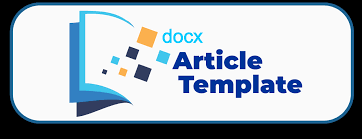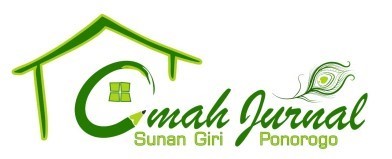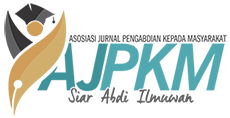Development of Environmentally Appropriate Technology Through Creativity Cooking Oil into Aromateraphy Candles in Dupak Magersari Surabaya
DOI:
https://doi.org/10.37680/amalee.v5i2.6082Keywords:
Appropriate Technology, Aromatheraphy Candles, Sustainable Development, Used Cooking OilAbstract
The utilization of used cooking oil into aromatheraphy candles is an effort to develop the creativity of residents to reduce liquid waste pollution in the surrounding environment. Due to the large amount of used cooking oil produced by daily home activities in Dupakmagersari, there is a wonderful chance to manage waste more effectively by turning it into aromatherapy candles. The residents can use this innovation as a creative enterprise since they can sell the products to make money. The purpose of this research is a way to minimize waste oil pollution that can threaten environmental damage and human health. This research uses methods from the problem solving, determination, manufacture, and distribution stages. So that the results of this research, the Dupak Magersari community, Jepara Village, Bubutan Subdistrict, Surabaya City, especially Srikandi Kapirel squad can have the skills to utilize waste oil into goods that have selling value, namely aromatheraphy candles. The community will benefit from the ability to produce and market aromatherapy candles made from used cooking oil, which will increase revenue.
References
Akinsemolu, A. A. (2020). Waste Management BT - The Principles of Green and Sustainability Science (A. A. Akinsemolu (ed.); pp. 173–195). Springer Singapore. https://doi.org/10.1007/978-981-15-2493-6_8
Alvarado-Herrera, A., Bigne, E., Aldas-Manzano, J., & Curras-Perez, R. (2017). A Scale for Measuring Consumer Perceptions of Corporate Social Responsibility Following the Sustainable Development Paradigm. Journal of Business Ethics, 140(2), 243–262. https://doi.org/10.1007/s10551-015-2654-9
Cahyani, N., Putri, F., Meta, D., Hidastri, G., Nurjanah, A., & Premipara, L. (2023). Socialization of Used Cooking Oil Processing into Wax in Pandeyan Village, Ngemplak District, Boyolali Regency. Jurnal Pengabdian Teknologi Tepat Guna, 4(2), 131–137.
Denni, N. P. R., Puryana, I. G. P. S., & Antarini, A. A. N. (2019). Mutu Minyak Goreng Pada Pedagang gorengan di Kecamatan Denpasar Utara. Journal of Chemical Information and Modeling, 53(9), 1–18.
Febrianto, F., Setianingsih, A., & Riyani, A. (2020). Determination of Free Fatty Acid in Frying Oils of Various Foodstuffs. Indonesian Journal of Chemistry and Environment, 2(1), 1–6. https://doi.org/10.21831/ijce.v2i1.30288
Garnida, A., Rahmah, A. A., Sari, I. P., & Muksin, N. N. (2022). Sosialisasi Dampak dan Pemanfaatan Minyak Goreng Bekas Di Kamping Jati RW. 005 Kelurahan Bauran. Kecamatan Serpong, Kota Tangerang Selatan. Seminar Nasional Pengabdian Masyarakat LP UMJ, 7–13.
Intan, D. R., Lubis, W., Harahap, W. U., & Ginting, L. N. (2022). Daur Ulang Limbah Minyak Goreng Sebagai Bahan Baku Sabun. Martabe : Jurnal Pengabdian Kepada Masyarakat, 5(2), 456–462.
Javanmardi, E., Liu, S., & Xie, N. (2023). Exploring the Challenges to Sustainable Development from the Perspective of Grey Systems Theory. Systems, 11(2). https://doi.org/10.3390/systems11020070
Latue, P. C., & Rakuasa, H. (2023). Spatial Analysis of Landscape Suitability of Ambon City for Settlement Using Geographic Information System. Jurnal Riset Multidisiplin Dan Inovasi Teknologi, 1(02), 59–69. https://doi.org/10.59653/jimat.v1i02.218
Mensah, J. (2019). Sustainable development: Meaning, history, principles, pillars, and implications for human action: Literature review. Cogent Social Sciences, 5(1), 1653531. https://doi.org/10.1080/23311886.2019.1653531
Pan, C.-L., Bai, X., Li, F., Zhang, D., Chen, H., & Lai, Q. (2021). How Business Intelligence Enables E-commerce: Breaking the Traditional E-commerce Mode and Driving the Transformation of Digital Economy. 2021 2nd International Conference on E-Commerce and Internet Technology (ECIT), 26–30. https://doi.org/10.1109/ECIT52743.2021.00013
Pramitasari, A., Ningsih, S., & Setyawati, K. (2024). Pemberdayaan Masyarakat Dalam Pengelolaan Limbah Jelantah Kelurahan Durenjaya Kota Bekasi. 22–27.
Qidi, J. (2021). Research on Influencing Factors of Retail Sales in E-Commerce Market. 2021 2nd International Conference on E-Commerce and Internet Technology (ECIT), 16–19. https://doi.org/10.1109/ECIT52743.2021.00011
Ruggerio, C. A. (2021). Sustainability and sustainable development: A review of principles and definitions. Science of The Total Environment, 786, 147481. https://doi.org/https://doi.org/10.1016/j.scitotenv.2021.147481
Sain, Z. H., Nurtina, S., Agoi, M. A., & Thelma, C. C. (2024). Sustainable Development: Challenges and Strategies in South Asia, Spotlighting Pakistani Higher Education. In Journal of Information System and Technology Research (Vol. 3, Issue 2, pp. 80–85). https://ourworldindata.org/india-will-soon-overtake-china-to-become-the-most-populous-country-in-the-world
Saputri, W., Andryan, W., & Ismail, K. (2021). Kelompok 2- PEMBANGUNAN BERKELANJUTAN SDGs 2030; Zero Hunger (Goal2)-Pertemuan 10. ResearchGate, Goal 2: zero hunger, kelaparan. https://doi.org/10.13140/RG.2.2.27974.60489
Silveira, C., Reis, L., Santos, V., & Mamede, H. S. (2020). Creativity in prototypes design and sustainability - The case of social organizations. Advances in Science, Technology and Engineering Systems, 5(6), 1237–1243. https://doi.org/10.25046/AJ0506147
Situmeang, D. E., Hawa, M. M., & Ismail, K. (2021). PEMBANGUNAN BERKELANJUTAN SDGs 2030 Goals 4 ENSURE INCLUSIVE AND EQUITABLE QUALITY EDUCATION AND PROMOTE LIFELONG LEARNING OPPORTUNITIES FOR ALL "Memastikan kualitas pendidikan yang inklusif dan adil dan mempromosikan kesempatan belajar seumur hidup untuk. Research Gate, June, 1–19. https://doi.org/10.13140/RG.2.2.11219.96809
Subandi, A. Y. (2022). A BRIEF HISTORY OF SUSTAINABLE DEVELOPMENT PRINCIPLES AND. 17(1), 28–48.
Sudrajat, A. S. E. (2018). Pilar Pembangunan Berkelanjutan: Kajian Pengelolaan Sumber Daya Alam dan Lingkungan Kampung Batik Rejomulyo Semarang Timur. Riptek, 12(I), 83–88.
Suharyani, I., Nuriansyah, W. A., Ulfa, S. B., Sopiah, S. S., Akbar, W. R., Naros, D. N., Savira, J., Mursalim, A. H., Ghazany S, M. R. A., & Hajar, S. (2023). Utilization of waste cooking oil into aromatherapy candles. Community Empowerment, 8(12), 2094–2100. https://doi.org/10.31603/ce.10790
Thürer, M., Tomašević, I., & Stevenson, M. (2017). On the meaning of ‘Waste’: review and definition. Production Planning & Control, 28(3), 244–255. https://doi.org/10.1080/09537287.2016.1264640
Vanessa, M. C., & Bouta, J. M. F. (2017). Analisis Jumlah Minyak Jelantah Yang Dihasilkan Masyarakat Wilayah Jabodetabek. Politeknik Manufaktur Negeri Bangka Belitung, January, 1–20.
Wahdi, E. (2023). Utilization of Waste Cooking Oil as Activated Charcoal Dishwashing Cream Soap. Jurnal Sains Terapan : Wahana Informasi Dan Alih Teknologi Pertanian, 13(1), 41–47.
Widiyanto, A. F., Yuniarno, S., & Kuswanto, K. (2015). Polusi Air Tanah Akibat Limbah Industri Dan Limbah Rumah Tangga. Jurnal Kesehatan Masyarakat, 10(2), 246. https://doi.org/10.15294/kemas.v10i2.3388
Downloads
Published
How to Cite
Issue
Section
License
Authors who submit manuscript retain its copyright and grant Amalee right of first publication licensed under a Creative Commons Attribution-ShareAlike 4.0 International License (CC BY-SA 4.0) that allows others to access (search, read, download, and cite), share (copy and redistribute the material in any medium or format) and adapt (remix, transform, and build upon any material) the work for any lawful purpose, even commercially with an acknowledgement of the work's authorship and initial publication in Amalee: Indonesian Journal of Community Research and Engagement.














